
基礎生物学研究所




| Organizers | Yoh Iwasa (Kyusyu Univ., Japan) Stuart Pimm (Duke Univ., USA) |
|---|---|
| Venue | Okazaki Conference Center, Okazaki, Japan |
| Date | Jan. 25-30, 2004 |
| Poster |
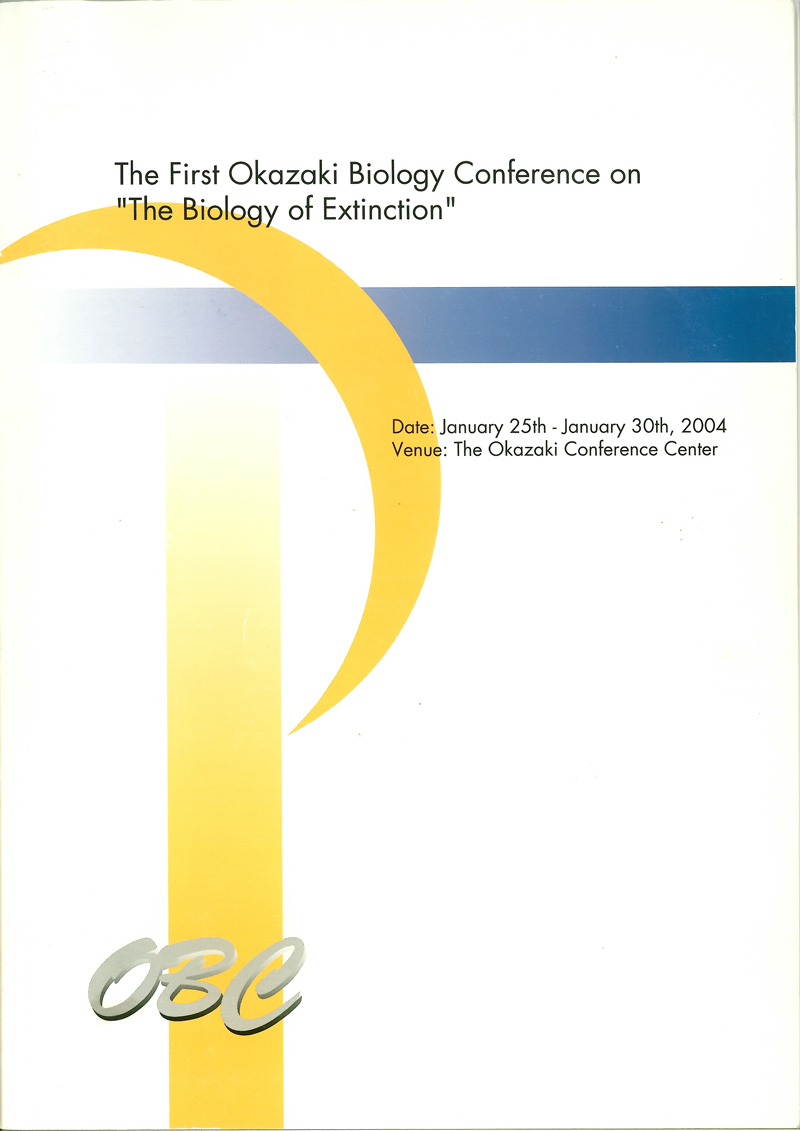
|
「絶滅」という現象をめぐって第一線の研究を展開している、理数生物学から生態学におよぶ幅広い専門分野の研究者を招待し、6日間にわたって徹底的に討論を重ねる場とした。取り上げられた話題は、化石時代の絶滅から、現在進行中の絶滅まで;種の多様性の生成・維持のメカニズムおよび種の絶滅のメカニズムの理論的考察;絶滅の発生生物学的討論;絶滅が招来する結果についてなど多岐にわたった。その結果、さまざまな時間的・空間的スケールや理論的切り口で絶滅を研究していながら、従来面識のなかった多くの研究者が親しく交流することが出来、「絶滅」という現象をめぐる研究者のソサエティーを立ち上げることができた。
Press Information
Nature
An editor, Dr. David Cyranoski, participated in the conference and wrote a short news article in the journal (Nature vol. 427 pp.477 "Extinction meeting kicks off Japan 's plans for networking" ( 5 February 2004 )).
Trends in Ecology and Evolution
The editor, Dr. Katrina A. Lythgoe, participated in the conference and commissioned several review articles from the conference, which will appear in the journal in 6 to 9 months.
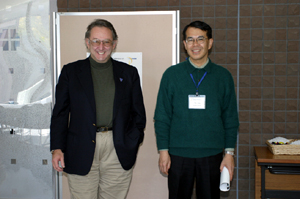
オーガナイザーのStuart Pimm教授(左)と巌佐庸教授(右)
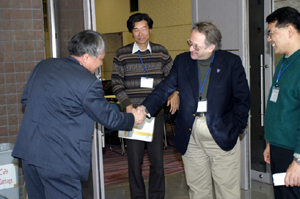
オーガナイザーと基礎生物学研究所の勝木元也所長
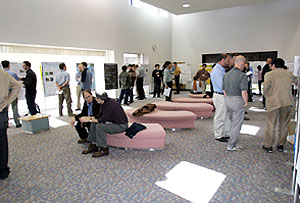
ポスター発表40件
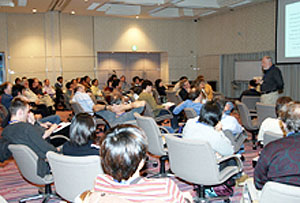
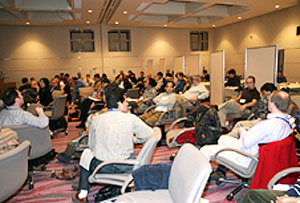
5日間の会期中、8つのセッションが開催され、活発な発表と議論が行われた。
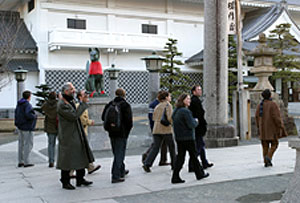
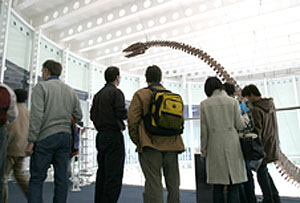
水曜日の午後には、蒲郡市生命の海科学館と豊川神社へのエクスカーションが行われた。
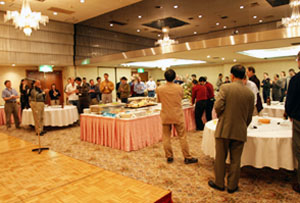
夕食会は岡崎ニューグランドホテルで行われた。
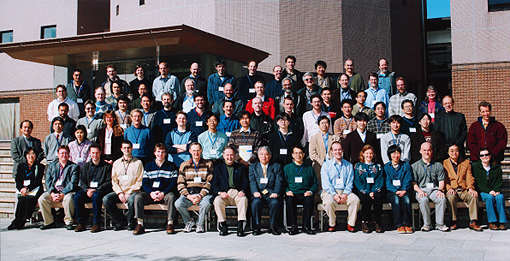
集合写真
January 25 (Sunday)
17:00-20:00
Get Together
January 26 (Monday)
08:30-09:20
Welcome Address and Introduction to Okazaki Biology Conferences
NAGAHAMA, Y. (Chair of OBC Committee, National Institute for Basic Biology (NIBB), Japan)
Introduction to “The Biology of Extinction”
IWASA, Y. (Organizer, Kyushu, Japan)
PIMM, S. (Organizer, Duke, USA)
Session 1 (Historic and Prehistoric extinctions)
09:20-12:10
“The timing and ongoing impact of megafaunal extinction in Australia”
FLANNERY, T. (Adelaide, Australia)
10:10-10:30
Coffee Break
“Caribbean Marine Extinctions on Different Time Scales: The Changing Roles of Geology, Climate, and People”
JACKSON, J. ( Scripps, USA )
“Extinction of genes, populations and fossil species”
CHIBA , S. ( Tohoku, Japan )
12:10-13:10
Lunch Time
Session 2 (Phylogenetic approaches to extinction and the consequences of non-random Species loss)
13:10-16:50
“Phylogenetic perspectives on the latest mass extinction”
NEE, S. ( Edinburgh, UK )
“Phylogenetic approaches to the study of extinction-recolonization dynamics”
SHAFFER, H.B. (UC Davis, USA )
14:50-15:10
Coffee Break
“Phylogenetic comparative studies of extinction risk in mammals”
PURVIS, A. ( Imperial College, UK )
“Ancient Radiation of African Cichlids? - Evidence from Retroposons”
TAKAHASHI, K. (NIBB, Japan )
17:30-19:30
Welcome Party
January 27 (Tuesday)
08:30-08:40
Announcement
Session 3 (Mechanisms of maintenance and production of species diversity)
08:40-11:30
“Modeling endemism, species richness and extinction on geographic scales”
COLWELL, R. ( Connecticut, USA )
“Contemporary global species Extinctions”
BROOKS, T. (Conservation International)
10:20-10:40
Coffee Break
“Community Canalization: One Reason Why Communities are Not Critical”
RUSSELL, G. ( Columbia, USA )
Session 4 (Populations and extinction risk)
11:30-17:00
“Dynamics of extinction in stochastic population models”
LANDE, R. (UC San Diego, USA )
12:20-13:20
Lunch Time
“Information transfer and extinction risk assessment of the endangered herb, Aster kantoensis”
SHIMADA, M. ( Tokyo, Japan )
“Reddening of Environmental Variability: Some Implications for Extinction Forecasts”
HALLEY, J.M. ( Aristotle, Greece )
15:00-15:20
Coffee Break
“Eroding viability of metapopulations in fragmented landscapes”
HANSKI, I. ( Helsinki, Finland )
“Spatial and temporal autocorrelation in extinction risk”
KUNIN, W. E. ( Leeds, UK )
January 28 (Wednesday)
08:30-08:40
Announcement
08:40-12:20
Poster session (Selected poster presenters will be requested to speak on Friday Morning)
PosterList.pdf
12:30-17:00
Excursion
January 29 (Thursday)
08:30-08:40
Announcement
Session 5 (Mechanisms of population extinction: genetical approaches)
08:40-11:30
“Genetics and extinction”
FRANKHAM, R. ( Macquarie, Australia )
“Toward predicting demographic and evolutionary fate of a population threatened: Primula Eco-Genome Project.”
WASHITANI, I. ( Tokyo, Japan )
10:20-10:40
Coffee Break
“Demographic and genetic consequences of forest fragmentation in the common understory berbaceous perennial Trillium camschatcense”
TOMIMATSU, H. ( Hokkaido, Japan )
Session 6 (Toward developmental biology of extinction: molecular biology of extinction enhanced by morphological specialization)
11:30-17:00
“Metamorphic timing in ambystomatid salamanders: Swimming the thin line between adaptation and extinction”
VOSS, S. ( Kentucky, USA )
12:20-13:20
Lunch Time
“Are cave animals an evolutionary dead end?”
WILKENS, H. ( Hamburg, Germany )
“Struggling with Red Queen: parasites, climatic changes, and human disturbance”
YAHARA, T. ( Kyushu, Japan )
15:00-15:20
Coffee Break
“Do Asexual Animals Face Evolutionary Dead Ends?”
VRIJENHOEK, RC. (Monterey Bay Aquarium Res. Inst., USA )
16:10-17:00
Panel discussion
lead by YAHARA, T. ( Kyushu, Japan )
17:00-17:15
Discussion
Discussion on Subsequent Conference of the Series
17:45-19:45
Dinner
January 30 (Friday)
08:30-08:40
Announcement
Session 7 (A session for short talks (8 talks), which will be selected among poster presenters)
08:40-12:20
4 talks
10:20-10:40
Coffee Break
4 talks
12:20-13:20
Lunch Time
Session 8 (Consequences of extinction)
13:20-15:00
“Living an increasingly unreliable world: The ecosystem consequences of biodiversity loss.”
NAEEM, S. ( Columbia, USA )
“Ecological Consequences of Global Warming: Past and Future”
ROOT, T. ( Stanford, USA )
15:00-15:20
Coffee Break
“Extinction risk and climate change”
THOMAS, C. ( Leeds, UK )
“The biology of extinction”
PIMM, S. ( Duke, USA )